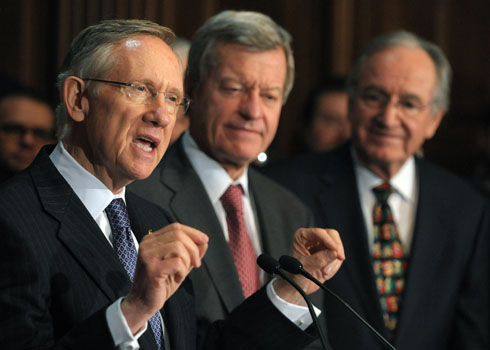Senate Majority Leader Harry Reid (D-NV) has announced that Sens. John Kerry (D-MA), Patty Murray (D-WA), and Max Baucus (D-MT) will serve a new deficit Super Committee. Murray will be the Democrats’ top member.
“I have great faith in Senator Murray as the co-chair of the committee,” Reid said in a statement. “Her years of experience on the Senate Budget and Appropriations committees have given her a depth of knowledge on budget issues, and demonstrated her ability to work across party lines. Senators Baucus and Kerry are two of the Senate’s most respected and experienced legislators. Their legislative accomplishments are matched only by their records of forging strong bonds with their Republican colleagues.”
Entitlement defenders were hoping for a more progressive bunch than this. But the key on the Democratic side of the new committee isn’t so much whether members will agree in principle to some entitlement cuts — most say they will — it’s whether they’ll require as a concession that Republicans agree to increase tax revenues.
And through that prism, there’s some reason for optimism.
Murray is a senior member of the Budget Committee, a proponent of balancing spending cuts and tax increases in a deficit deal, and, importantly, chairwoman off the Democratic Senatorial Campaign Committee. That has Republicans crying foul already, and here’s why: A hidden reason for the GOP’s ongoing deficit push has been to force Democrats to cut entitlement benefits on a bipartisan basis, to neutralize the GOP’s vote to phase out Medicare earlier this year. As the person in charge of electing Democrats to the Senate in 2012, Murray will have a powerful incentive to steer clear of policies that blur the sharp contrast between the parties on that issue.
Baucus is chair of the Finance Committee, and thus highly territorial about tax and entitlement issues. He’s also famous for having spent months seeking bipartisan consensus on universal health care legislation in 2009, only to have Republicans walk away. And as budget negotiations led by Vice President Joe Biden broke down earlier this year, Baucus, a member of that discussion group, agreed in principle to Medicare provider cuts — somewhat distinct from Medicare benefit cuts — but only if they were commensurate with new tax revenues. Republicans will never agree to that. As a member of President Obama’s fiscal committee, he voted against a proposal authored by chairs Erskine Bowles and Alan Simpson on the grounds that it wasn’t sufficiently balanced.
Kerry’s the surprise here. He’s a senior member of both the Senate and of the Finance Committee. On Meet the Press Sunday, he advocated for cuts and reforms to Medicare, Medicaid, and Social Security but acknowledged the need for “some revenue.” He has a military background and chairs the Foreign Relations Committee, which means he in particular will have an incentive to reach agreement with Republicans. If the Committee gridlocks it will trigger a penalty that includes a broad $500 billion cuts to military and defense spending over 10 years — something neither he, nor Defense Secretary Leon Panetta, nor President Obama want to see.
So the good news is the Democrats on the committee have all demanded balance in the past, and will have an incentive to stick to that demand. The bad news is balance has no agreed-upon definition, and if Republicans put up a trivial amount of new revenue, Democrats might be tempted to call it a win and cave.
We’ll have more of a sense of how likely that is when Senate Minority Leader Mitch McConnell announces his selections in the next few days. He, Speaker John Boehner (R-OH), and House Minority Leader Nancy Pelosi (D-CA) have until August 16 to name their picks.










